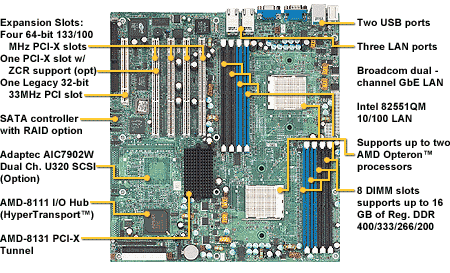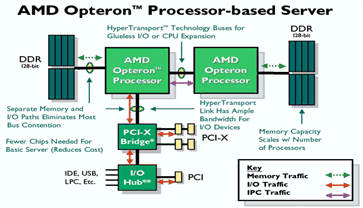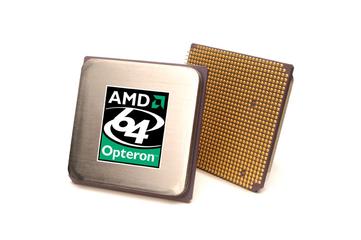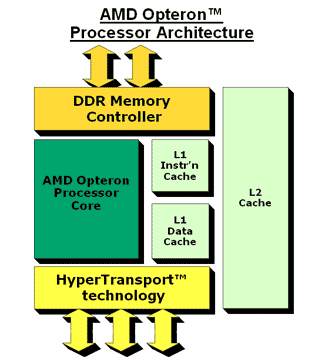Processor Features
- Compatible with Existing 32-Bit Code Base
Including support for SSE, SSE2, SSE3*, MMX.,
3DNow!. technology and legacy x86 instructions
*SSE3 supported by Rev E and later
- Runs existing operating systems and drivers
- Local APIC on the chip
- AMD64 Technology
- AMD64 technology instruction set extensions
- 64-bit integer registers, 48-bit virtual addresses,
40-bit physical addresses
- Eight additional 64-bit integer registers (16 total)
- Eight additional 128-bit SSE/SSE2/SSE3 registers
(16 total)
- Multi-Core Architecture
- Single-core or dual-core options
- Discrete L1 and L2 cache structures for each core
- 64-Kbyte 2-Way Associative ECC-Protected
L1 Data Cache
- Two 64-bit operations per cycle, 3-cycle latency
- 64-Kbyte 2-Way Associative Parity-Protected
L1 Instruction Cache
- With advanced branch prediction
- 1024-Kbyte (1-Mbyte) 16-Way Associative
ECC-Protected L2 Cache
- Exclusive cache architecture.storage in addition
to L1 caches
- Up to 1 Mbyte per L2 cache
- Machine Check Architecture
- Includes hardware scrubbing of major
ECC-protected arrays
- Power Management
- Multiple low-power states
- System Management Mode (SMM)
- ACPI compliant, including support for processor
performance states
|
940-Pin Package Specific Features
- Refer to the AMD Functional Data Sheet,
940-Pin Package, order# 31412, for functional,
electrical, and mechanical details of 940-pin
processors.
- Electrical Interfaces
- HyperTransport. technology: LVDS-Like
differential, unidirectional
- DDR SDRAM: SSTL_2 per JEDEC specification
- Clock, reset, and test signals also use DDR
SDRAM-like electrical specifications
- Packaging
- 940-pin lidded ceramic or organic micro PGA
- 1.27-mm pin pitch
- 31 x 31 row pin array
- 40 mm x 40 mm ceramic or organic substrate
- Ceramic or organic C4 die attach
- Integrated Memory Controller
- Low-latency, high-bandwidth
- 144-bit DDR SDRAM at 100, 133, 166, and 200
MHz (200 MHz supported by Rev C0 and later)
- Supports up to eight registered DIMMs
- ECC checking with double-bit detect and single-bit
correct
- HyperTransport. Technology to I/O Devices
- Three links, 16-bits in each direction, each supports
up to 2000 MT/s or 4.0 GB/s in each direction
(2000MT/s supported by Rev E and later)
- Each link on uniprocessor (UP) models supports
connections to I/O devices.
- Each link on dual-processor (DP) models supports
connections to I/O devices, and any one of the three
available links may connect to another DP or MP
processor.
- Each link on multiprocessor (MP) models supports
connections to I/O devices or other DP or MP
processors.
|



